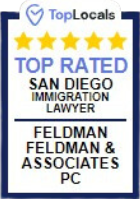The H-1B visa program allows US companies to temporarily employ foreign workers in skilled
occupations that require theoretical or technical skill set. Technology companies, universities, and hospitals are significant users of the H-1B program.
However, there is an annual limit on the number of new H-1B visas issued each fiscal year, known as the H-1B cap. For fiscal year 2024, the H-1B cap is 85,000, with 20,000 spots set aside for those with a US master’s degree or higher.
What does this H-1B cap mean for your visa application? As an H-1B visa attorney, San Diego applicants depend on, we can explain the cap and its implications in depth. Read on to understand the likelihood of selection, steps to improve your chances, and what happens if you aren’t chosen.
We’re an award-winning San Diego, California, law firm with 50+ years of experience in immigration law.Talk to an immigration attorney at Feldman Feldman & Associates PC by calling 1-619-299-9600 today.

What Is the H-1B Cap?
The H-1B cap refers to the annual limit on standard H-1B visas set by Congress. Each fiscal year (October 1 to September 30), there is a cap of 65,000 new H-1B visas issued to foreign workers in skilled occupations.
An additional 20,000 H-1B visas are available to those who earned a master’s degree or higher from a US institution. This makes the total H-1B visa cap 85,000 each year.
Once USCIS receives enough applications to meet the cap, they stop accepting new H-1B petitions for that fiscal year. The date they stop receiving applications is known as the “final receipt date.”
Petitions received after the final receipt date must wait until USCIS begins accepting applications for the next fiscal year on April 1.
Why Is There an H-1B Cap?
Limits on the annual H-1B visa issuance began in 1990 to balance industry demands for high-skilled labor with concerns that foreign workers were displacing American ones.
Over time, employers argued the cap was too restrictive. In response, Congress expanded the cap multiple times in the 1990s and 2000s before settling on the current 65,000 standard visas and 20,000 advanced degree exemption system.
Proponents argue the cap encourages American education and protects domestic wages and jobs. Critics counter that it leads to a need for more critical tech and science skills that hamper economic growth. The debate over the appropriate number rages on.
As an H-1B visa attorney in San Diego, we regularly help clients navigate the complexities caused by the H-1B cap.
When Does the Cap Impact Applications?
The H-1B cap comes into play when more petitions are received in the first five business days of April than available spots.
USCIS tracks and reports the number of applications against the available H-1B numbers in real time. It is difficult to predict when they will hit or exceed the cap. It has occurred within just five days of the filing window opening in recent years.
Once the cap is reached, USCIS will only accept applications counting toward the exemption for those with advanced degrees in the US. The final receipt date is also announced at this time.
Petitions filed until this final receipt date are entered into the selection process. Those submitted one day later will be denied or delayed until the next fiscal year.
H-1B Cap Selection Process
Because demand for new H-1B visas continually outpaces supply, a random lottery is used to allocate the coveted spots. Here is how it works:
Petition Ranking and Lottery
All Petitioners (the prospective H-1b employers) must registrer the H-1b Beneficiaries (the prospective H-1b employee) into an online lottery during the first few weeks of March. Then, the electronic random lottery is done by USCIS at the end of March. First, the seclections are done from the regular cap. Then, anyone who is not selected, but has a US Master’s or higher degree from a qualifying institution will have a chance at the remaining 20,000 spots.
Notification of Selection
Employers are notified of selection via returned petitions with official receipts and next steps. Selected petitions then move forward in normal USCIS H-1B processing. Unfortunately, many applicants each year are not selected in the H-1B lottery.
What Happens If You Aren’t Selected?
Being entered in the lottery does not guarantee selection. With so much demand in recent years, around 20% of applicants for standard H-1B visas are expected to get chosen.
Here is what you can expect if your petition isn’t picked:
-
You are still eligible to apply for other non-immigrant or immigrant status options.
-
You miss out on the chance for an October 1 H-1b start date that same fiscal year
-
You must wait until the next fiscal year filing window (March 1 registration opening for an October 1 start date) for another attempt
The selection odds may improve in subsequent years if fewer petitions get filed or more H-1B numbers become available. But there is no advantage or carry-over benefit for those not initially picked.
Strategies for Improving Odds of H-1B Cap Selection
While the lottery itself is random, there are some strategies employers and foreign workers can employ to improve their chances of being chosen for the annual H-1B cap.
Apply for the Advanced Degree Exemption
Earning a master’s or doctoral degree from a non-profit or public institution of higher education in the United States boosts your odds substantially over those entering the regular cap pool.
Aim to complete an eligible US academic program well before needing H-1B status. Proof of completing the degree including transcripts will be required to qualify for the 20,000 reserved exemption spots.
Have a Back-Up Plan
Keep an alternate strategy handy if your H-1B application isn’t selected. Look into other work visas you may qualify for or extend your practical training period, such as a TN, F-1 CPT, O-1, E-3, E-2 or other nonimmigrant visa.
Also, discuss remote overseas employment options with the petitioning employer so you can still work on critical projects.
As an H-1B attorney in San Diego, we help clients develop comprehensive plans to address various H-1B visa scenarios.
How Does Selection Impact Processing?
Getting picked under the H-1B cap is a big hurdle, but USCIS still needs to approve the petition and confirm that you will work in a qualifying specialty occupation tied to your enducation. If you decide to travel abroad after having an approved H-1b petition, you will need to get a visa stamp at the US consulate abroad prior to returning.
Request for Evidence
After the lottery, routine H-1B procedures resume. Sometimes USCIS will issue a Request for Additional Evidence seeking more proof of skilled occupation criteria, maintenance of status, employer-employee relationship, or other issues that the officer wants clarified.
Respond promptly and thoroughly to these requests. Failing to convince adjudicators and provide adequate documentation and explanation of the issues at hand may still lead to a denial despite cap selection.
Visa Stamping Appointments
Once approved, foreign employees go through visa application procedures abroad. Schedule a visa stamping appointment promptly, as backlogs at some embassies have lengthy processing times.
Ensure you bring a valid passport, supporting employer letter, all documents related to your appointment scheduling (DS-160 confirmation, visa fee payment, and appointment notice) and the original H-1B approval notice from USCIS to this appointment.
Other Important H-1B Cap Considerations
Beyond improving selection odds and post-lottery processing, keep these key points in mind:
Cap Exemptions
Those working at higher education institutions, nonprofit entities related to or affiliated with an institute of higher education, and nonprofit or governmental research organizations are not subject to the congressionally mandated H-1B caps.
Additionally, if you already have been selected in the H-1b lottery and want to amend the terms with the same employer or change employers, you do not have to worry about the H-1B visa caps.
Cap Gap Automatic Extension
F-1 students selected in the lottery, whose OPT will expire between April 1 and October 1 of the same year, that they file a cap-subject H-1B petition are elgiible for “Cap Gap OPT” to cover the period from when their F-1 OPT expires to when their H-1b status commences on October 1st.
Make sure the Form I-20 certificate of eligibility is kept valid while the change of status application is in process.
Frequently Asked Questions
-
What Percentage Of H-1b Applications Were Selected In The Lottery For Fiscal Year 2023?
USCIS reported selecting 27% of petitions submitted for the standard 65,000 H-1B visa cap and 63% of those qualifying for the 20,000 advanced degree exemption.
-
Can I Re-Submit My Application Again In The Same Fiscal Year If I Don’t Get Picked In The Lottery?
Unfortunately, no. You must wait until the next fiscal year filing window beginning April 1 to enter the lottery again with a fresh application. There are no second chances or carry-over advantages for those not selected.
-
Does My Employer Have Better Odds In The Lottery If They File H-1b Petitions For Multiple Employees?
No, each petition stands entirely on its own. There are no volume discounts or employer advantages to filing more petitions. Each foreign worker entered has the same random chance of selection under the H-1B cap.
-
Can My Employer File An H-1b Petition Now Even If I Won’t Start Working For 6 More Months?
Yes, filing up to 6 months before employment begins is possible. Just be sure to indicate accurately the requested start work date and provide evidence to back this timeframe up. Early filing ensures you meet deadlines for cap selection lotteries.
-
What Happens If My Petition Gets Selected But Then Denied Later During Adjudication?
Unfortunately, cap selection is no guarantee that USCIS will ultimately approve your H-1B visa petition, even if the employer and foreign worker meet program criteria. Make your most robust case with ample credible evidence to convince adjudicators. Have a backup option, too.
Connect with an experienced H-1B visa attorney serving San Diego today to discuss your application questions and concerns.
Contact a H-1B Visa Attorney
A complex application process capped by strict annual limitations makes navigating the H-1B program difficult, especially for employers needing to fill critical skills gaps quickly.
Understanding the lottery system, filing strategically early, responding thoroughly to evidence requests, and working with an experienced immigration attorney significantly improve your chances of H-1B visa success.






